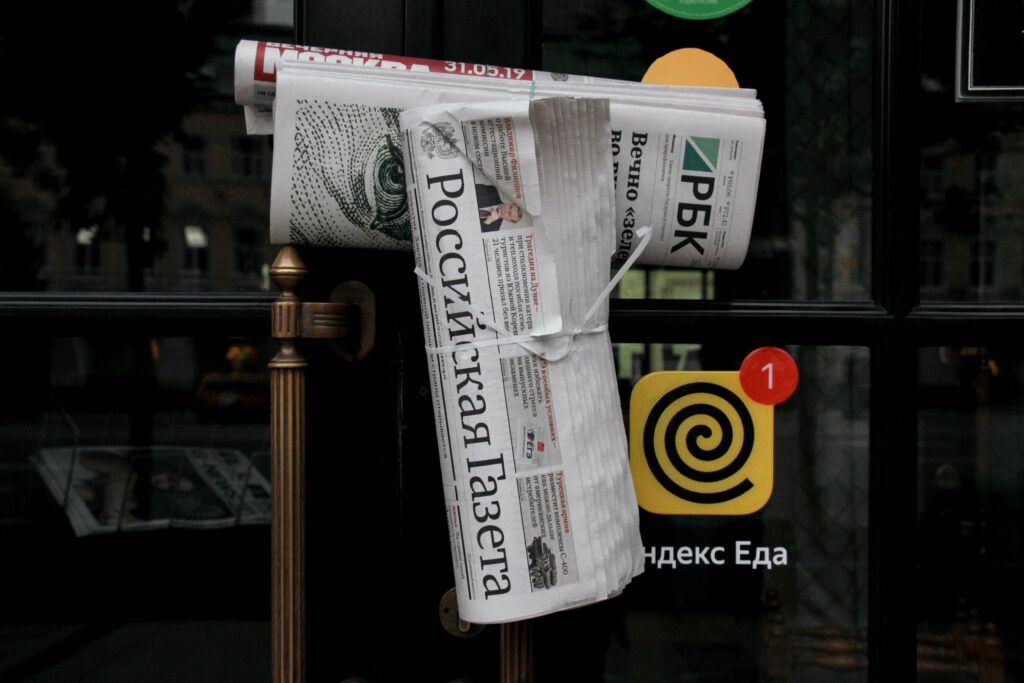
By Amber Bereznyckyj, History and Creative Writing student at the New College of the Humanities
Russian Channel One news presenter, Marina Ovsyannikova, protested against the war in Ukraine on a live broadcast stating ‘No to war.’ In a pre-recorded video, she admitted that she felt embarrassed that she ‘allowed the zombification of the Russian people’ in consciously spreading propaganda from the Kremlin. Putin’s criminalisation of ‘fake news’ means that Ovsyannikova is facing a fifteen year sentence for referring the the conflict as a war.
This has unearthed the blatant techniques previously used by the Soviet Union to enact influence across the world stage. Journalistic freedom has always been an issue in Russia. It was ranked 10th in the world for most journalist murders. Putin has killed more than twice as many reporters than his predecessor, Yeltsin. Since the start of Putin’s military attack against Ukraine, 15,000 protesters have been detained. Over two dozen Russian media outlets have been blocked by the state’s media regulator. Some of them include Echo of Moscow, Znak and Novaya Gazeta, who won the Nobel Peace Price in 2021 and have seen six of their journalists killed over the last two decades. The same goes for social media platforms, such as Facebook and Instagram, which, too, were banned after 40,000 people left comments on Ovsyannikova’s Facebook page. This gives the impression that we are sure to expect a spike in disappearances amongst the journalists in the next following months, both, within Ukraine and Russia.
With many domestic stations banned, Russia has turned to the famous Fox News Presenter, Tucker Carlson, in order to spread revisionist, Kremlin-devised propaganda across Russia and the West. Over the last few months, Carlson has been on an aggressive front. He invalidated Ukraine as a small and irrelevant country, portraying it as one which Nato does not care about. Carlson has progressively become more antagonising as he detests American public support for Ukraine. He makes racist comparisons between Putin and China stating: ‘it might be worth asking ourselves…why do I hate Putin?’, ‘Does Putin call me racist?,’ ‘Did he manufacture a worldwide pandemic?’ and ‘Does he eat dogs?’. He ultimately suggests that Putin hasn’t done anything for an international response; unlike China. This highlights Russian backdoor influence undercurrent in the West and is a worrying reminder that propaganda is at play. However, Carlson has come under fire more than ever when it was revealed that his long-time colleagues, camera man, Pierre Zakrzewski, and Ukrainian Consultant, Oleksandra Kuvshynova, died on the fourteenth of March after their vehicle came under fire by Russian militants in Horenka.
The Russian people have been isolated from the world in recent weeks, only being able to view the State regulated news channel and Fox News. It should be recognised that Putin has enacted Orwellian propaganda techniques, which will inevitably cut the Russian nation from international communication. The solution appears to be short distance radio frequencies and invasive pop-up ads which disseminates the real situation in Ukraine. The pop up ads are done through a coding script created by the Berlin based company, New Now. It is designed to pop up on any website that uses the same script when someone with a Russian IP is online. Furthermore, the app for the Russian Pharmacy brand, Ozerki, was hacked on the 28th February, telling Russians to ‘wake up’. Propaganda used to be an isolating, totalitarian technique, however with the mass digitalisation of the twenty-first century, viruses can now become a positive thing and counter-narratives can be spread. Even the general population has been bombarding Yandex (Russia’s equivalent of google) with tourist reviews, disseminating the true acts in Ukraine. Only with decisive, unified action will we topple this one-man war.